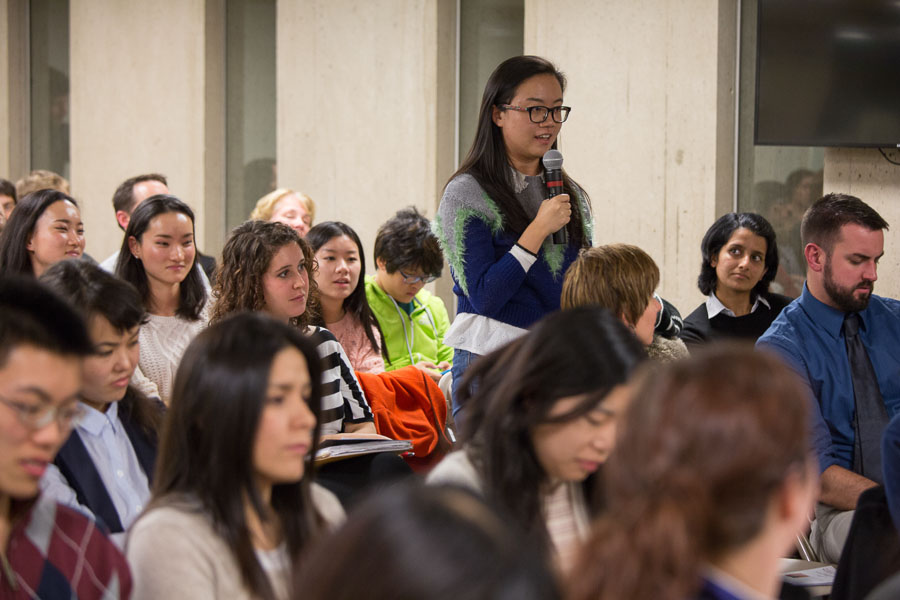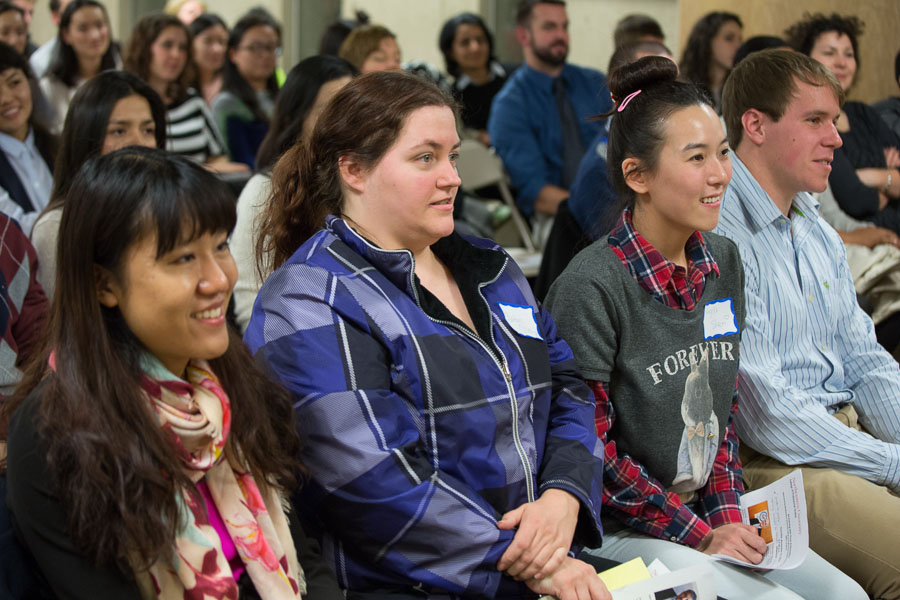It’s not easy leaving your friends and family behind for a station in a foreign country, especially when you don’t speak the language, when you’ll be in the middle of tricky negotiations, and your cultural customs are at odds.
Yet somehow, to preserve international peace and dialogue, it’s a job that needs to be done.
On Thursday, November 21, 2013, three ambassadors who had been stationed in Norway, North Korea, India, Sri Lanka, Bangladesh and Nepal, among many other countries during their careers, shared their thoughts on navigating tricky human rights situations, early fumbles, and the role serendipity plays in a diplomat’s life during a special forum hosted by the Master’s in Global Studies and International Affairs program at Northeastern University College of Professional Studies.
Called “An Evening with Three Ambassadors,” U.S. Ambassador Barry White, German Ambassador Friedrich Loehr and Kyrgyzstan Ambassador Baktybek Beshimov spoke to a packed room about how they ended up as diplomats, in some cases after careers as politicians and lawyers.
Serendipity Plays a Role
One key takeaway that all three ambassadors mentioned was the role that serendipity played in not only their assignments, but sometimes in day-to-day operations.
Ambassador Loehr, a career foreign service professional, had had his eye on a spot as the German ambassador to France.

A Global Students student poses a question to the Ambassadors during the event. Photo by Heratch Ekmekjian.
Next thing he knew, he was on his way to serve as the German ambassador to North Korea.“I wanted to deal again in Franco-German relations, but I hadn’t worked at the Paris embassy previously, so I was out,” he said. “And that’s when they said, well, we have a post that is technical, difficult and that no one else wants to do.”
“My minister told me, ‘Good luck, if it works out. If it doesn’t, you’re on your own.’” He said, “It was an important lesson to learn but it also helps you to feel strong, even during North Korean nuclear testing.”
Early Fumbles
Ambassador White, a career lawyer and political activist, said an early challenge came when he was first sent to represent the United States in Norway, just before President Barack Obama arrived to receive the Nobel Peace Prize. As an aside, members of the U.S. State Department asked Ambassador White to speak to Norway’s foreign minister about the country’s whaling industry, which had plans to double its quota for whaling, an idea unpopular in the U.S.
“I had a great meeting with the foreign minister, and at the very end, I mentioned the whaling negotiation,” White said. “He said, ‘Don’t you talk to me about whaling when you know nothing about it,’ and gave me a 15 minute lecture. And he was right, I didn’t know the issues. So I learned to not always do what I was told to do unless I was fully briefed on it.”
Navigating Cultural Differences
All three ambassadors spoke about how cultural differences play a large role in their daily lives as diplomats – even in the face of serious issues, like the investigation of human rights violations.
“It’s so important for diplomats to understand their own way of thinking, to understand their hearts and their minds,” he said. “You have to understand the value of a life of their citizens, and what kinds of connections exist between authorities and people.”Ambassador Beshimov said that after his stationing as Kyrgyz Ambassador in India, Sri Lanka, Bangladesh and Nepal, he’s learned that it’s incredibly important to not impose your own rules and your own culture on others.

Global Studies students, part of 100 audience members, listened intently to the stories and advice from the three Ambassadors. Photo by Heratch Ekmekjian.
Ambassador Loehr echoed the sentiment, noting how difficult it was to explore human rights violations in North Korea.
“They used to say we know nothing about such things, or they protested Western society trying to undermine their socialist system,” he said. “Or during cocktail receptions, sometimes they would say, ‘We have our criminals and you have your criminals, and we deal with them in our way, and you deal with yours in your way. What’s wrong with that?’”
The forum was moderated by Dr. Mary Thompson-Jones, director and faculty member of the Global Studies and International Affairs program, who also wrote a blog post about the event on Boston.com’s Global Business Hub blog.
Two of the ambassadors will be teaching new Regional Studies courses this Winter quarter. Students can take GST 6505: Regional Studies Southwest and Central Asia with Ambassador Beshimov or GST 6501: Regional Studies: East Asia with Ambassador Loehr. Both classes are on campus and are now open for registration.
Northeastern University’s College of Professional Studies (CPS) is committed to providing career-focused educational programs that are designed to accommodate the complex lives of motivated learners. Offered in a variety of innovative formats, CPS courses are taught by accomplished scholars and practitioners who have real-world experience. The result is an educational experience founded on proven scholarship, strengthened with practical application, and sustained by academic excellence.
Founded in 1898, Northeastern is a comprehensive, global research university. The university offers more than 80 undergraduate majors and more than 165 graduate programs, ranging from professional master’s degrees to interdisciplinary PhD programs. Northeastern’s research enterprise is aligned with three national imperatives: health, security and sustainability. Northeastern students participate in co-op and other forms of experiential learning in 90 countries on all seven continents.